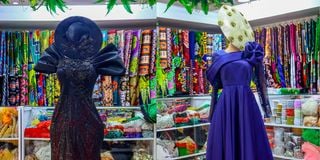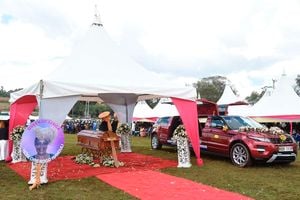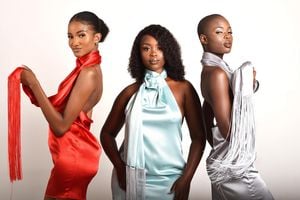
Funeral outfits designed by Kate Mayeye Okaranime, a fashion designer and founder of African Fabrics and Design Kenya on October 11, 2024.
It has always been an unspoken rule that when you go to a funeral, you wear black and modest. But over the last few months, black and modest is being replaced.
Funeral wear and fashion are now intertwined, with lavish, expensive, and over-the-top clothes and accessories coming into display. Take the example of a recent prominent funeral service in Nairobi, where from the widower to the guests, each mourning attirewas a clear statement that the outfits have evolved from boring, dark-coloured dresses to extravagantly styled ones.
Well-to-do Kenyans are going all out and hiring stylists for funerals, some to style the dead, others to style the mourners.
Morine Aringo, the owner and designer of Hando Afrikan Designs in Nairobi, says, “Gone are the days when people just wanted clothes with clean cuts that fit. The preference now is for comfortable, glamorous outfits.
Morine who started her fashion brand six years ago, says she remembers about three years ago when she started getting clients who wanted stylish funeral outfits.
“I noticed this just after Covid-19. I think the pandemic did something to people. Many wanted to do more, to live the good life. Death therefore became more of a celebration rather than a mere mourning of the dead,” she says.
It is no longer unusual for style-conscious mourners to bend the rules.
“Nowadays, in addition to black dresses and overalls, wealthy mourners go for stylish jewellery, complete with iconic fascinators and eye-catching gloves. You can even mistake a funeral for a social event because of what people wear nowadays,” she says.

Morine Hando, the owner and designer of Hando Afrikan Designs, in a black gown.
Morine recalls one client who had lost her father-in-law.
The discussion between her and the client on what outfit to wear lasted two hours because of the unique details she wanted on her dress.
“She took time to explain to me that her father-in-law was a good man and she wanted to celebrate his life with a wonderful outfit. She instructed me to make a dress fit for a red carpet. The dress was to have a long train, and sequins and lace were to be part of the embroidery. The back of the dress was to remain bare, and there was to be a bow at the waist,” says Morine.
The woman also wanted a conspicuous fascinator and elbow-length lace gloves to complement the look.
It was not an easy job for Morine, as she only had 10 days to complete the outfit as the funeral dates that had already been set.
The client paid Sh50,000 for the entire look. Since then, her list of customers has gotten longer, with women in their late 30s and early 40s being the topmost making orders for stylish, tailor-made funeral outfits.
“I also designed a ball gown for a client who was the daughter of the deceased. Her reason for wanting a ball gown was interesting. She felt that she needed to wear something extra beautiful to her father’s funeral since he would never be able to see her in her wedding dress. I thought that was sweet,” Morine says.
"These are women who want to look nice and can afford to. They don't care if they appear dramatic or overdressed, because they are not doing it for anyone but themselves,” Morine adds.

Morine Hando, the owner and designer of Hando Afrikan Designs, in a yellow gown with ankara detail.
Sh100,000
Kate Mayeye Okaranime, founder of African Fabric and Designs Kenya, who last month showcased her clothes at the New York Fashion Week, agrees that stylish funeral outfits are now in vogue.
In the course of her work, she has been commissioned to design bespoke garments not only for people attending funerals but also for the dead.
“Someone will come and say, 'When my mum, my aunt, my sister was alive, they were stylish. They loved the finer things in life, so make for me a proper dress to bury them in.’ And such customers spare no expense to make sure their loved ones look glamorous in whatever they are buried in,” Kate tells Lifestyle.
She believes the change in funeral attire is a way for people to express themselves. For the longest time, black has been the preferred colour for funerals, but who says that cannot be challenged?

Kate Mayeye Okaranime a fashion designer and founder of African Fabrics and Design Kenya during an interview at Kilimani on October 11, 2024.
“My clients sometimes tell me, ‘My dad hated black or my mum loved bright colours, so why not make it a celebration?’ Now, people are going all out. We are at a point where we are not so afraid to talk about death. It is no longer strange for the living to tell their family or friends what they want to wear when they die," she says.
This has made it easier for funeral fashion to develop. One of the dresses, she remembers, had dramatic sleeves, a huge hat, and gloves, and was in white and grey colours. Others, she says, have gone so far as to ask for feathers, jewellery, and lace that stand out.
“The clients I have had are mostly in their 40s, and when it comes to cost, they give me an open budget. The full outfit can cost more than Sh100,000,” she says.
Style a dead person
Kenyans are also hiring stylists for funerals, some to style the dead, others to style the mourners. Celebrity stylist Brian Babu is among the stylists who are reaping big from this new industry.

Celebrity stylist Brian Babu.
Babu still remembers the first paid job he got as a stylist more than 10 years ago. It was to dress a dead person.
It was an interesting assignment for him at the time, and he says it opened up a whole new avenue of business that he never thought existed.
“After that job, which I did in 2011, I started consulting on similar requests. Not only dressing the dead but also family members. Nobody wants to wear a plain black dress to a funeral; people are looking for something more that tells of their personality or the relationship they had with the deceased. So far it has been overwhelming, and the clients I have been getting are not afraid to spend money,” says Brian.
Babu’s job is to conceptualise a look and source for the outfits. Depending on the client's needs, his services can range from Sh10,000 to Sh50,000.
“There is a revolution going on in the fashion world, and it is a good thing. Dressing up has become part of our lives, and this is now being reflected in funerals. That is why funeral attire these days is so colourful,” he says.
“Everyone should be allowed to mourn in whatever they feel comfortable in. I think that is very important, and there is nothing wrong with wanting to look nice and stylish when saying goodbye to someone you have loved,” he says.





